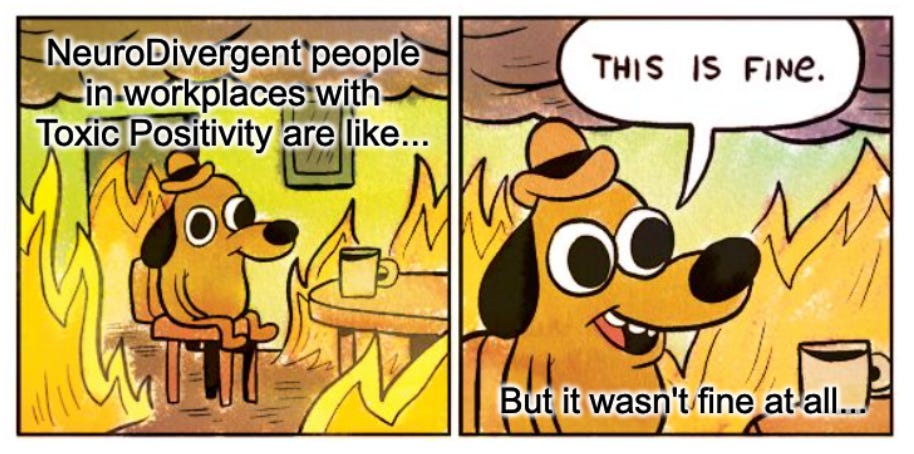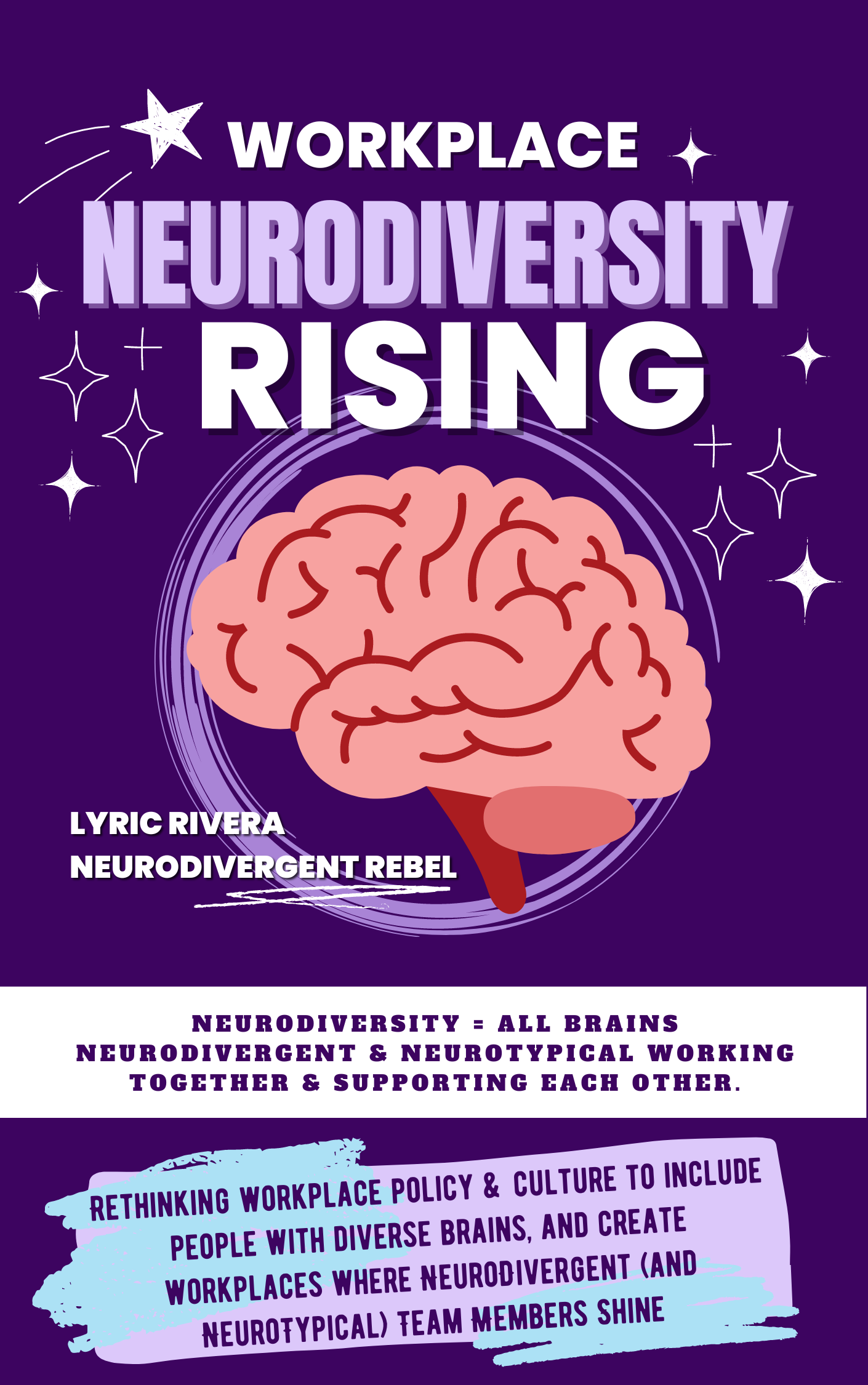NeuroDivergent Emotional Safety and Organizational Culture
Some workplace cultures should also be avoided at all costs (as they can be highly toxic to those whose minds work differently or who have other disabilities).
Welcome back to another Founding Member Friday!
“Founding Member Friday” - on Thursday because our truck (home) is being worked on (new breaks) tomorrow (on Friday).
Twice each month on Friday, I put out an exclusive post like this one (often on a more intimate and personal topic OR featuring some of the training materials I’m teaching) that will be brought to you by and for our Founding Members.
The first part of this post is always FREE to everyone here on Substack, and the ending of the post is ONLY available to our Founding Members (as thanks for the extra support they give to make this blog possible).
We currently have eleven Founding Members. I won’t put them on the spot today, but you know who you are. I can’t thank you enough for your support.
My name is Lyric Rivera. I am a non-Binary human who uses the gender-neutral pronouns they/them, xe/xem, I even go by it/its if you’re being nice about it.
I'm a late diagnosed multiply Neurodivergent adult (meaning my NeuroDivergence wasn’t discovered until I was already an adult).
I didn't find out I was NeuroDivergent until I was 29 (when I was diagnosed Autistic). I was diagnosed with ADHD a few years later (and it was much less of a surprise) in my mid-30s.
Most of my professional career was spent not knowing that I was NeuroDivergent (because these differences in how our minds work are invisible). Which meant I was not adequately accommodated in many spaces I entered – and was treated like (and believed I was) the problem.
However I was NOT the problem, the problem was the exclusionary organizational cultures that favor the NeuroTypical “norm,” “average,” or “typical” brain - if such a think exists (and I’m not sure it does).
Not knowing I was NeuroDivergent meant not being able to speak up for my needs (because I didn’t know what they were). I didn’t know I had a disability and needed adjustments to make things equitable. I didn’t have the knowledge of how to access (or that I was legally entitled to accessing) the separate pipeline - the disability accommodation pipeline.
There are people like me, who may be completely unaware of their brain differences. I’ve known people learning about their NeuroTypes much later in life than I did.
When we create separate channels dependent on disclosures and medical diagnosis, we miss the undiscovered Divergent minds hiding in plain sight.
This is one of the main reasons I began my work with organizations, asking them to change the way they teach, write policies, and design spaces – so that we can create spaces that work, regardless if someone discloses (or knows) that they are NeuroDivergent or not.
It's relatively likely (unless your workplace is particularly hostile to those whose minds work differently) you DO have NeuroDivergent people on your teams RIGHT NOW.
If you DON'T have NeuroDivergent coworkers (that you know about), it could point to a more significant issue - that people don't feel safe and lack the emotional safety needed to share this part of themselves in your spaces.
OR suppose there TRULY are no NeuroDivergent People in your space. In that case, your space could be so hostile to NeuroDivergent People that it is chasing them away (or preventing them from being hired).
Let's assume you have NeuroDivergent coworkers right now (whether they've shared this information with you or not):
While fixing your physical workspaces and changing organizational policies are very concrete, some changes organizations need to make spaces more accessible to all NeuroDivergent People are a bit more ambiguous.
Organizational culture describes and defines how an employee is expected to behave within an organization. At the center of an organization's culture sits its commonly shared values and beliefs (all of which must be supported by planning, careful design, and structure).
A strong culture is a common feature among successful organizations. A company's culture will impact the collaboration and productivity employees demonstrate daily.
Strong cultures often have fewer disagreements, enhanced trust and cooperation, and are more efficient when making decisions.
People who work within organizations with strongly defined cultures can easily understand how leaders within the organization would want them to respond in any situation.
For an organization's culture to improve performance, its beliefs, and values must be widely shared and firmly upheld.
Successful (values driven) organizations go out of their way to communicate their cultural identities to all team members. Their values drive them and allow their values to determine how the organization will run.
Organizations must decide which values to emphasize and communicate them to all team members.
If you don't actively create the culture you DO want within your organization, a culture you DON'T want can develop organically.
An ineffective or toxic culture can weigh an organization down, leading to poor communication, high turnover, disengaged employees, bad customer relations, and lower profits.
Before starting as an independent NeuroDiversity Consultant, I was the VP of Marketing and Organizational Change Agent for an AMAZING (and truly inclusive) consulting firm.
Our culture at the firm was not defined by "perks." We were a values-driven organization, meaning we had a culture of shared core values that were clearly outlined and understood by ALL members of the team.
Our clearly defined organization's values created a unified team with clear directions and goals. This clarity would carry us through both the best and most challenging times.
In the spring of 2020, when the pandemic came to the United States, many organizations were forced to move to working remotely (something our team had already been doing for months).
The companies whose cultures were built on more shallow office perks struggled while our culture tied us together.
We didn't have air hockey tables, premium coffee bars, or office bicycles. Instead, our culture was defined by the values and goals essential to us as a team.
As a company, we were always clear about our goals, intentions, and initiatives. Our achievements were measured in outcomes and not hours worked (which also helped us attract and retain productive and self-motivated people).
Organizational cultures are constantly evolving, meaning the best employers regularly assess and audit their organization's culture, helping to ensure that teams and departments can stay engaged, productive, and satisfied with their work.
In addition, certain types of organizational cultures are naturally more inclusive than others.
Some workplace cultures should also be avoided at all costs (as they can be highly toxic to those whose minds work differently or who have other disabilities).
For example, organizational cultures that encourage toxic positivity and shame people into hiding their weaknesses and struggles can be exceptionally harmful.
I like to call this the "everything's fine culture" where nobody is willing to speak about an organization's conflict, problems, or pain points.

In these environments, showing weakness (or needing help) is often taboo.
When this type of culture forms, even NeuroTypical and non-disabled team members may be hesitant to speak up when they need help, feel overwhelmed, or are being assigned more than they can realistically handle.
Though "everything's fine cultures" are hard on everyone within an organization, they are most harmful when people NEED to ask for help.
In cultures that champion self-sufficiency and discourage people from asking for help (or speaking up about struggles and weaknesses) people with disabilities may feel unable to ask for the accommodations they need (and are legally entitled to) because doing so means they may be looked down upon by leadership and peers.
Propper accommodations are often necessary for NeuroDivergent and disabled people to access equitable employment opportunities.
Questions to ask:
Is YOUR organizational culture based on perks and personalities, OR is it based on shared VALUES and GOALS?
Does your culture discriminate against NeuroDivergent People by valuing NeuroTypical traits and behaviors? (You have to ask your ND team members this one, as NTs don't always know what harms ND people)
Is your organizational culture saturated with toxic positivity?
Does your culture stigmatize people who ask for help, or does it empower them to equip themselves for success?
What about NeuroDivergent emotional safety?
NeuroDivergent Rebel’s Substack (and the entire social media presence) is a reader-supported publication. Founding Members, have access to the full post (as well as ALL pad posts and two exclusive Founding Member Posts each month) as thanks for making the free public resources I create possible.

This excerpt is based on the book Workplace NeuroDiversity Rising. Workplace NeuroDiversity Rising, named “trend for 2023” and praised in Forbes as “an excellent ‘how to manual’ based on lived experience and professional competence”.
This book was written, specifically for organizations who want to be more inclusive of NeuroDivergent People, but I’ve tried to write this guide in a way so that it will be universally applicable in many scenarios.
Workplace NeuroDiversity Rising is intended to be a tool that can help ANYONE who wants to make the world, or the spaces around them more inclusive for NeuroDivergent (and all) People, in organizations, communities, schools, and beyond.
I’ve been working with organizations for years, but I’m only one person, and there is a LOT of work that needs to be done to fix the world, and our workplaces. I hope this easy to read, affordable, guide will be a valuable tool, offering clear guidance, that can help those who read it start making immediate changes to the spaces around them.
.



